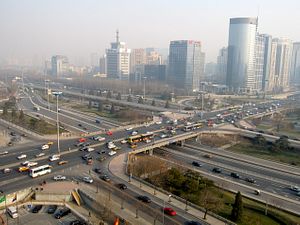On December 25, the China-led Asian Infrastructure Investment Bank (AIIB) effectively launched in earnest, marking a major milestone in China’s bid to play a more active role in global governance and development. With the ratification of the bank’s Articles of Agreement by 17 member states, representing 50.1 percent of the bank’s capital stock, the AIIB entered into force. The members that have ratified that bank’s Articles of Agreement include Australia, Austria, Brunei, China, Georgia, Germany, Jordan, Luxembourg, Mongolia, Myanmar, the Netherlands, New Zealand, Norway, Pakistan, Singapore, South Korea and the United Kingdom.
In a press release on the bank’s website, the AIIB interim secretariat noted that “Entry into force under Article 59 of the Articles of Agreement required deposit of such instruments by at least 10 Signatories with at least 50 percent of the shares allocated.” The next step for the bank as it moves toward becoming operational as a full-fledged multilateral development bank will be the inaugural meeting of its Board of Governors, which will be held on January 16 and 17 in the new year. The interim secretariat, in the same release, notes that “the Board of Governors will announce the commencement of operations, in accordance with Article 60 of the Articles of Agreement.”
The inaugural meeting of the Board of Governors is really when the bank will “kick off,” so to speak. According to Article 60 in the AIIB’s Articles of Agreement, the inaugural governors meeting will formally anoint Jin Liqun (whom I wrote about here), a Chinese bureaucrat and vice minister of finance, its first president. The meeting will additionally elect directors for the bank, set a start date for the bank’s formal operations, and decide a range of other administrative matters.
2015 has been a banner year for the AIIB. In March, eager to meet the deadline for founding membership, a range of countries, including western states, rushed to submit their applications. In Asia, the bank’s appeal is nearly universal. As my colleague Shannon Tiezzi wrote at the time, “Japan is nearly alone in Asia in not joining the AIIB.” In discussions of China’s rise in 2015, the AIIB is commonly brought up as an example of China’s growing institutional ambition on the international stage. The bank is commonly invoked as an example of a Chinese alternative to the powerful post-World War II financial institutions favored by the United States and its western allies, including the International Monetary Fund and the World Bank. In Asia, the AIIB is seen as a foil to the Asian Development Bank, where Japan plays a major role.
Heading into 2016, we’ll see the AIIB emerge as a new player in the world of development financing in Asia. With a total capitalization of $100 billion, the AIIB is no small fry on the international stage. For the United States, coming to terms with the AIIB has been difficult. In March 2015, when it emerged that the United Kingdom and other western European states would join, Washington very publicly voiced its concerns about the bank’s governance standards.
As I discussed in September, after Chinese President Xi Jinping’s latest state visit the United States, it appears that Washington is making peace with the AIIB’s existence and popularity. The United States’ worries about the bank are well-placed to an extent. The governance structure in effect codifies a veto for China over where the bank’s funds are used–with 26 percent voting power, no three-quarter majority decision is possible at the AIIB without Beijing’s imprimatur.
That said, given China’s overt preference (reflected in the Articles of Agreement, by the way) to dole out capital and technical assistance from the AIIB solely based on economic considerations and setting aside “the political character of the member concerned,” there is little chance that Beijing will be able to deploy the AIIB to effect any wily geopolitical machinations. For Washington and Tokyo, it may be best to observe the AIIB’s emergence in 2016 and let it operate freely. If circumstances favor success for the AIIB, Washington and Tokyo may even finally sign up to join the bank.

































